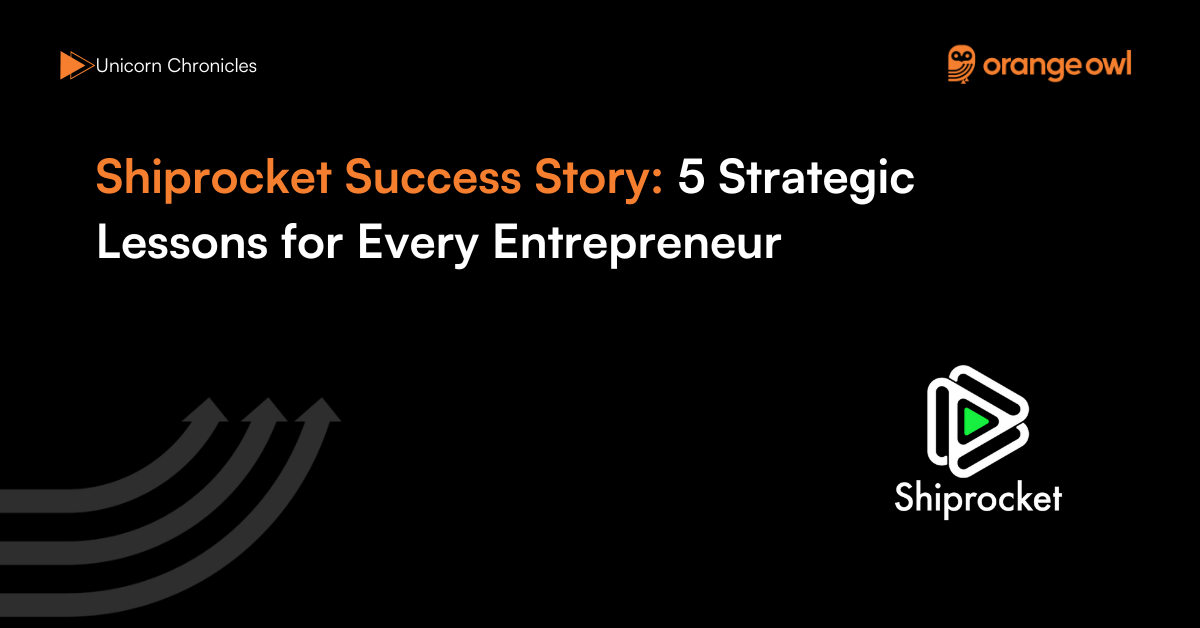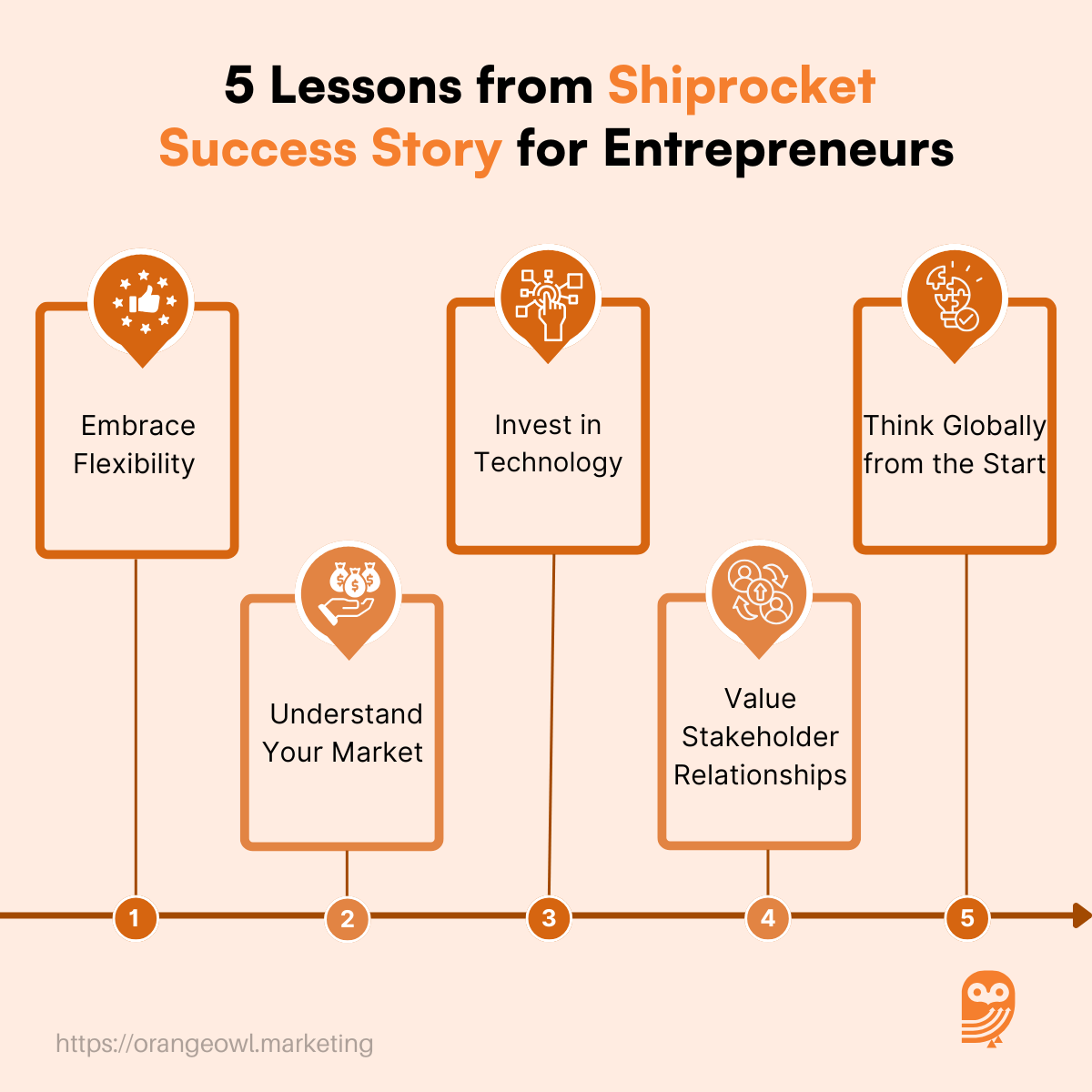Shiprocket Success Story: 5 Strategic Lessons for Every Entrepreneur
Vivek Goel
June 7, 2025

Table of Contents
Introduction
Shiprocket’s rise from a bootstrapped venture to one of India’s leading logistics-tech unicorns is a powerful example of how innovation and deep customer understanding can transform an entire industry.
Founded in 2012 by Saahil Goel and Gautam Kapoor as BigFoot Retail Solutions, the company originally set out to help Indian SMBs build online stores. But soon, the founders discovered that the real bottleneck wasn’t setting up an e-commerce storefront—it was the lack of accessible, affordable, and reliable logistics.
This realization gave birth to Shiprocket, a platform designed to democratize shipping for Indian sellers by integrating courier partners, automation, and data intelligence into one seamless solution.
“We envisioned an India where every MSME would embrace digitisation and compete on a level playing field with the big guys,” said Saahil Goel, Co-founder and CEO of Shiprocket.
Today, the platform serves over 150,000 sellers and handles more than 200 million shipments annually across 29,000+ pin codes in India and 220+ international destinations.
In 2022, Shiprocket reached unicorn status with a $1.2 billion valuation after raising $33.5 million in a round led by Temasek and Lightrock India. The company has raised over $280 million in total and continues to scale rapidly, riding the D2C and e-commerce boom.
By positioning itself as the backend engine for India’s retail revolution, Shiprocket has become much more than a logistics player—it’s now a growth partner for thousands of digital-first brands across Bharat.
Origin Story
The inception of Shiprocket was born out of a firsthand understanding of the hurdles faced by small and medium businesses (SMBs) in managing logistics in a rapidly digitizing economy.
Co-founders Saahil Goel and Gautam Kapoor, driven by a mission to empower India’s budding e-commerce entrepreneurs, initially set out to create a Shopify-like platform named Kartrocket in 2012. The idea was to simplify online store creation for Indian sellers and help them take their businesses digital.
However, as they interacted more closely with SMBs, a deeper challenge became evident—logistics. While sellers could build websites and list products online, they constantly struggled with fragmented, expensive, and inefficient shipping solutions. This friction often made or broke their ability to scale.
It became clear to the founders that solving the last-mile delivery problem held far greater value than just enabling e-commerce storefronts. This realization sparked a bold pivot.
They decided to shift from being a storefront solution provider to becoming a tech-enabled logistics aggregator. This shift gave rise to Shiprocket, with a vision to democratize shipping by offering SMBs access to a wide network of courier partners through a single platform.
“We tried building a shopping cart in the beginning… But within a few years, we realised it wasn’t working.” — Saahil Goel, Co-founder & CEO, Shiprocket
This early decision to pivot not only redefined their business model but also laid the foundation for what would become one of India’s most successful logistics tech platforms.
Business Landscape and Early Challenges
Shiprocket entered the logistics space at a time when the Indian e-commerce ecosystem was still maturing. The logistics sector, in particular, was heavily dominated by large players catering mainly to established enterprises.
For SMBs, accessing reliable and cost-effective shipping services was a nightmare. This created both an opportunity and a challenge for Shiprocket—to bridge the gap for underserved sellers while navigating a highly competitive, infrastructure-heavy industry.
In its early years, the startup encountered multiple challenges:
- Multiple Pivots: The transformation from Kartrocket to Shiprocket was not a linear path. It involved rethinking everything—from the product offering to customer engagement and technology infrastructure. Moving from building e-commerce websites to becoming a logistics enabler meant reengineering the core business strategy, retraining teams, and rebuilding technology systems tailored for fulfillment and shipping.
- Stakeholder Alignment: Such a significant pivot required careful communication with investors, partners, and employees. Many had backed the original vision of Kartrocket. Convincing them to support a new, untested direction was not easy. The founders had to establish credibility for the new model while assuring stakeholders of the long-term potential.
- Resource Constraints: Operating on limited funds meant the company had to be scrappy. They couldn’t afford to build expansive warehouses or fleets like traditional logistics players. Instead, they focused on building a tech-first platform that could seamlessly integrate with courier partners and help businesses manage their shipping through automation, data intelligence, and easy onboarding.
Despite these constraints, Goel and Kapoor maintained clarity of purpose. They were determined to solve a real and painful problem and committed to delivering value not just to customers, but also to their investors and early believers.
“We had to stop what we were doing and start from scratch while trying to take all stakeholders, including investors, along.” — Saahil Goel, Co-founder & CEO, Shiprocket
Their resilience through these foundational years enabled Shiprocket to not just survive the initial setbacks, but also emerge as a transformative force in the Indian logistics tech landscape.
Growth Strategies
Shiprocket’s impressive growth trajectory is the result of a combination of focused strategy, deep market understanding, and smart execution. One of its key growth levers has been its courier aggregation model.
By partnering with multiple courier companies such as Delhivery, Blue Dart, and FedEx, Shiprocket gave businesses—especially small and medium-sized ones—the flexibility to choose the most reliable, cost-effective shipping option for each order. This aggregation not only improved delivery success rates but also optimized shipping costs and expanded geographic coverage.
Another crucial growth driver was technology integration. From the outset, Shiprocket emphasized building a strong tech backbone. By incorporating AI and automation, the platform could optimize shipping routes, provide real-time tracking, forecast delivery timelines, and minimize human error.
These technological advancements significantly improved the overall customer experience and helped businesses manage logistics with greater efficiency.
Shiprocket also accelerated its capabilities through strategic acquisitions. Acquiring Wigzo Tech, a marketing automation startup, enabled Shiprocket to offer hyper-personalized communications and increase customer retention for its clients.
Similarly, the acquisition of Glaucus Supply Chain Solutions helped expand its warehousing and fulfillment capabilities. These integrations strengthened Shiprocket’s value proposition as not just a shipping platform, but a full-stack e-commerce logistics solution.
At the core of Shiprocket’s expansion was a laser-sharp focus on MSMEs (Micro, Small, and Medium Enterprises). Understanding that traditional logistics providers often overlooked this segment, Shiprocket designed pricing models, onboarding processes, and dashboard features that catered specifically to small business needs. This focus unlocked access to a massive and previously underserved market.
Finally, Shiprocket began laying the groundwork for global expansion. With increasing demand for cross-border commerce and global dropshipping, the company started developing solutions for international logistics. This move positioned Shiprocket to not only lead the Indian market but also become a key player in global e-commerce logistics.
Marketing Strategies
Shiprocket’s marketing strategy has played a pivotal role in establishing it as a trusted name in the e-commerce logistics space. A cornerstone of their approach has been thought leadership.
The company regularly participated in industry conferences, webinars, and published whitepapers to share insights on logistics, e-commerce, and SME enablement. This helped position Shiprocket not merely as a service provider, but as a strategic partner and expert in the logistics space.
Another key element has been the strategic use of customer success stories. By showcasing real-life examples of businesses that scaled using Shiprocket’s platform, they created social proof that resonated strongly with other aspiring entrepreneurs and MSME owners. These stories served as authentic testimonials that highlighted the platform’s tangible impact.
In the digital arena, Shiprocket maintained a strong presence on platforms like Instagram, LinkedIn, and YouTube. Their content ranged from educational posts and case studies to platform tutorials and behind-the-scenes looks at their operations.
This consistent digital engagement helped them build a community, attract leads, and retain brand recall among their target audience.
Together, these marketing strategies helped Shiprocket gain visibility, build credibility, and establish a loyal user base—contributing significantly to its growth journey.
5 Strategic Lessons for Every Entrepreneur
1. Embrace Flexibility
One of the most powerful lessons from Shiprocket’s journey is the importance of being adaptable. The founders initially launched Kartrocket as a shopping cart platform, but when they realized that the real bottleneck for their customers was logistics—not store creation—they made the bold decision to pivot.
This shift wasn’t easy and required letting go of their original vision, but it ultimately unlocked far greater growth potential. Entrepreneurs must be willing to reassess their strategies, acknowledge when something isn’t working, and pivot toward opportunities that better align with market needs.
2. Understand Your Market
Shiprocket’s success was deeply rooted in its intimate understanding of the pain points faced by MSMEs in India. Rather than building a generic logistics solution, the company focused on creating tools that addressed the specific challenges of small sellers—such as cost-effectiveness, courier selection, and automation of shipping workflows.
This user-centric approach ensured higher adoption and loyalty. For entrepreneurs, this highlights the value of market research and customer empathy. Tailoring offerings to a clearly understood audience can be the key differentiator in a crowded space.
3. Invest in Technology
From day one, Shiprocket placed a strong emphasis on technology as a growth enabler. Whether it was integrating AI to optimize delivery routes or building a seamless API for third-party platforms, technology was not just a support function—it was central to their value proposition.
The automation of logistics processes improved efficiency, enhanced user experience, and scaled operations without exponentially increasing costs. Entrepreneurs should view technology as a long-term investment that can drive innovation, streamline operations, and sustain competitive advantage.

4. Value Stakeholder Relationships
When Shiprocket pivoted from Kartrocket to logistics aggregation, convincing stakeholders—including investors, team members, and partners—was critical. The founders prioritized transparent communication, sharing their vision and rationale behind the strategic shift. This helped maintain trust and support even during uncertain times.
Entrepreneurs should never underestimate the importance of stakeholder alignment. A clear, honest, and inclusive approach can make transitions smoother and foster long-term loyalty from those invested in the business.
5. Think Globally from the Start
Although Shiprocket began by serving Indian MSMEs, its infrastructure and strategy were designed with scalability in mind. This foresight allowed the company to eventually pursue cross-border commerce and global dropshipping opportunities.
Entrepreneurs should think beyond immediate markets and consider how their solutions can evolve to meet global demand. A scalable vision from day one not only attracts more ambitious partners and investors but also ensures that the business is ready for exponential growth when the time is right.
Conclusion
Shiprocket’s remarkable evolution from a modest startup to a billion-dollar unicorn is a shining example of what can be achieved with resilience, strategic clarity, and relentless innovation. What began as an attempt to build a Shopify-like platform in India quickly transformed into one of the country’s most influential e-commerce logistics enablers—driven by a deep understanding of the pain points faced by small and medium businesses.
The founders’ ability to identify this gap, pivot decisively, and build a technology-first solution has been at the heart of Shiprocket’s growth.
By focusing on the underserved MSME segment, Shiprocket democratized access to logistics and fulfillment infrastructure—tools that were once reserved for large enterprises. Today, thousands of independent sellers across India rely on Shiprocket to reach their customers, deliver on time, and scale operations.
The company’s mission, as stated by co-founder and CEO Saahil Goel, is to “democratise e-commerce by creating a simple, open and enabling platform for every independent business of the real Bharat.” This vision has not only driven business success but also contributed to the empowerment of small entrepreneurs across the country.
For today’s entrepreneurs, Shiprocket’s story is a blueprint for building a customer-centric, adaptable, and innovation-led business. It highlights that success doesn’t always come from sticking rigidly to a business plan—but rather from listening, learning, and evolving with your market.
In a dynamic landscape where customer expectations and technology are constantly shifting, the ability to respond swiftly and thoughtfully is the true mark of a visionary founder.


